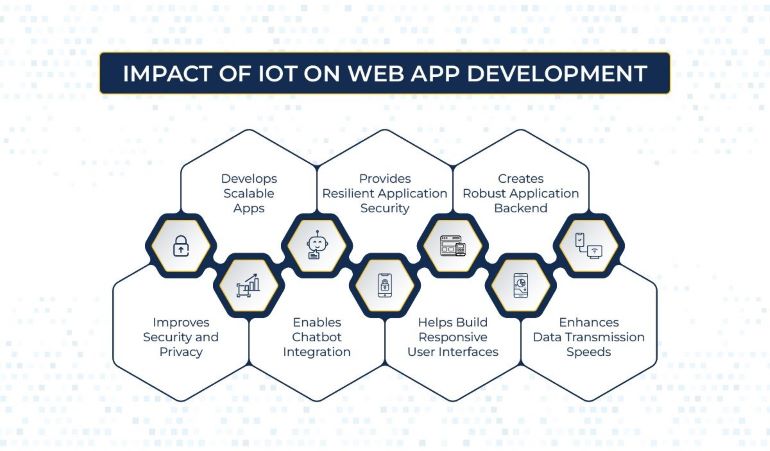IoT has turned what was formerly dubbed sci-fi into reality. From the Orwellian telescreen to real-life smart devices, the Internet of Things (IoT) has come a long way. And no, it doesn’t necessarily paint a dystopian future for us.
Technology has a dark side for sure, but it’s the bright side that concerns us. Let’s explore what the future of IoT and web app development holds for us.
This article talks about the rise of emerging technologies, specifically the Internet of Things, and its impact on web application development.
What is the Internet of Things IoT?
The Internet of Things, abbreviated as IoT, is a network of interconnected devices that allows users to transfer data in real-time.
The goal of the network is to exchange information in real-time to enable convenience, smart decision-making, and improve efficiency. It uses the internet to exchange and transfer information between devices and objects.
IoT has revolutionized not only the enterprise world but also private life. It allows businesses to streamline their business processes, transform complex tasks into easier ones, and improve the overall productivity of the workforce.
What is Different About IoT Applications?
Traditional web applications use browsers to perform tasks over the internet. For this, web apps run on a web server rather than on local systems.
IoT applications are the user-facing part of the IoT device. While the app runs on the device, users can monitor and control the connected IoT devices. These apps don’t just display online content but also let users control things in the physical world.
This extra communication requires additional features for a larger amount of data sharing. However, it also adds more complexity to the application infrastructure.
That is why web development for the Internet of Things IoT is different from traditional web applications.
For an ordinary person using IoT, the technology helps use interconnected devices to manage home appliances. For example, you can use your phone to turn your room’s air conditioner on or off.
Reports suggest that the Internet of Things IoT industry is expected to grow threefold, from roughly 10 billion devices in 2020 to almost 30 billion devices in 2030.
But what does the internet of things has to do with web app development?
Let’s find out.
IoT Web App Development
Using IoT for application development is going to become indispensable as people increase their demand for smarter, more reliable, and integrated applications.
The Internet of Things is an excellent technology for gathering real-time information and using it to make better decisions. It is precisely this sort of capability that enables IoT and web app development to solve many industrial problems.
However, traditional web development lacks the capability to manage the exchange of vast amounts of data between devices and users. It’s not possible to do so without using advanced computing methods and responsive user interfaces.
But the Internet of Things overcomes this problem by using cloud-based networks that enhance data transfer speeds between devices.
The future of web app development is clearly moving towards these emerging technologies: the Internet of Things, artificial intelligence, cloud computing, machine learning, big data, etc.
Companies and end users can utilize IoT web app development to build smart, efficient, and scalable products. Businesses will be able to leverage the power of big data gathered from IoT devices by using machine learning algorithms and AI to extract useful insights.
Given this shift, it is clear that IoT web app development is set to grow. Let’s see how IoT impacts web application development.
Impact of IoT on Web App Development

Here are some of the significant ways in which IoT impacts and improves web application development.
-
Develops Scalable Apps
IoT, as mentioned before, collects immense amounts of data through its network of interconnected devices and users.
However, traditional apps cannot manage, let alone leverage, this vast data pool. An application must be scalable to be able to handle and unlock the power of big data.
-
Provides Resilient Application Security
The Internet of Things functions by connecting devices and relaying information via the internet in real-time. But if your internet connection is unstable, it is a major drawback.
Thus, IoT requires you to build a resilient application capable of recovering lost data packets when your internet connection goes down.
-
Creates Robust Application Backend
Top IoT trends enables developers to build powerful backends capable of managing all sorts of backend functions – be they related to processing requests or storing critical applications and user data.
While many developers focus on building responsive, delightful, and intuitive user interfaces (UI), it is equally important to work on building a robust application backend.
Without a sound backend, an application is incapable of performing well. Thus, the use of IoT encourages and promotes the development of powerful application backends.
-
Improves Security and Privacy
IoT uses the internet to transfer data between devices. And since IoT networks can be expansive, i.e., connected to multiple devices and users, the networks are vulnerable to cyberattacks.
Thus, a single security loophole in your IoT app or network can jeopardize your entire network and IoT data. To prevent such cyberattacks and data breaches, you must build a credible and strong security system using security protocols and authentication features.
You also need to use some form of encryption to ensure that the data you transfer between IoT devices is secure from breaches.
Therefore, IoT web app development enables you to build a secure web application, as your team is responsible for following through on security guidelines in the application development process.
Moreover, it also helps ensure the privacy of IoT application users’ data.
-
Enables Chatbot Integration
IoT applications also offer chatbot integration. AI Chatbots are virtual assistants used to provide enhanced customer service by automating the support system.
Many web applications, websites, and mobile apps now use bots to deliver a better service and user experience.
Chatbots reduce your customer support budget by automating the process and interacting with end users using human-like responses.
Moreover, you can gather a lot of customer-related data from chatbots and transfer it to other IoT devices in real-time using the internet.
-
Helps Build Responsive User Interfaces
A dynamic user interface is a critical component of a successful web or mobile application. It allows users to interact with your application effectively, and it also draws attention to your application.
IoT aids developers in building responsive and delightful user interfaces by analyzing customer preferences through the data gathered from IoT devices. Many developers use AngularJS or React JavaScript to build advanced user interfaces.
-
Enhances Data Transmission Speeds
IoT functions using the internet – it provides an infrastructural setup that lets businesses exchange data in real-time across various regional sites and locations.
For example, your warehouse can use IoT apps to update inventory levels in the database at the headquarters of the company.
Summing It Up
The Internet of Things has become one of the most powerful modern technologies. And when you combine it with other technologies like cloud computing, AI/ML, etc., the benefits are too many to ignore.
In the coming years, IoT and web app development will go hand in hand as businesses seek to build secure, scalable, and high-performing web applications to achieve business goals.
You can create interactive IoT web apps capable of rendering critical business insights through the use of data analytics and AI/ML.
Do you want to build an IoT web application for your business?
Drop us a line today at [email protected] to learn more about our expertise in web app development and emerging technologies.

